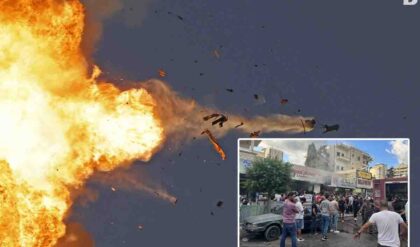After a two year delay, the F-35B finally touched down in the UK. A trio of Joint Strike Fighters—two from the USMC and one in RAF badging—were “dragged” by a KC-10A Extender across the Atlantic, with the jets landing at RAF Fairford at around 8pm local time. No PR or marketing dweeb on the planet could have dreamed up a better backdrop for their arrival, as double rainbows framed the jets on the tarmac perfectly.
Undoubtedly, it was a good day for the UK Ministry of Defense and the F-35 program.
The flight was delayed 48 hours due to issues with the KC-10 Extender that was scheduled to meet the F-35Bs at MCAS Beaufort before heading out across “the pond.” After the KC-10 was repaired, the flight made its way to the UK without any reported issues. Of course, when it comes to the F-35, we often find out later how things really went. RAF Typhoons formate on the three-ship of F-35Bs as they approach the UK, RAF
RAF Typhoons formate on the three-ship of F-35Bs as they approach the UK, RAF
The jets will be displayed at the Royal International Air Tattoo on July 8 and 9, and then at the Farnborough Airshow the following week. One of the F-35Bs will reportedly perform a vertical landing for air show goers on a specially constructed aluminum pad at RAF Fairford. It is widely known that F-35B’s super-heated and crushingly powerful exhaust has the ability to do major damage to runways and deck surfaces without elaborate fortifications. A USMC KC-130J was also sent to the UK to perform a mid-air refueling demo with the F-35B in tow.
The F-35B is arguably the most relevant and promising Joint Strike Fighter variant. While at the same time it’s short-takeoff and vertical landing (STOVL) requirement dictated the design of the F-35 overall, handicapping its carrier-based and conventional counterparts in the process. Only about 15% of the Joint Strike Fighters slated to be produced will be the STOVL F-35B variant. The Royal Navy and RAF are hoping to procure 138 of the jets in total over the coming decades. By 2023, the MoD plans to have 42 of the jets ready by 2023, with 24 being used to equip the Royal Navy’s new carrier, the HMS Queen Elizabeth, and 18 will be used for training. BAE Systems
BAE Systems
Although the successful arrival of the F-35 in the UK is a good step forward for the troubled program, it is being treated absurdly by some aviation fans out there, bashing F-35 “haters” for criticizing the program in the past.

Second, crossing the Atlantic in an amazing accomplishment if you are living in the late 1920s or early 1930s. For the most advanced fighter jet in the world—one that has been flying for a decade and is many years behind schedule and cost tens of billions of dollars to develop this far—doing so is a long overdue step forward for the program—nothing more. Originally, after years of prior delays, the flight was supposed to happen occur years ago but was cancelled after an F-35 burned on the runway due to an engine fire. News that the program had rescheduled the mission to this summer was released only early this year.
 Matt Cardy/Getty Images
Matt Cardy/Getty ImagesIn the end, the F-35 program and the MoD deserve a day in the sun for finally getting the F-35 across the Atlantic to the UK. But the reality is that after ten years of flying and piles of cash, the idea that simply ferrying an F-35B from the US to the UK is some sort of massive triumph is as much a sign of just how low the bar has fallen for this program than how far it has come.
Contact the author at [email protected]





